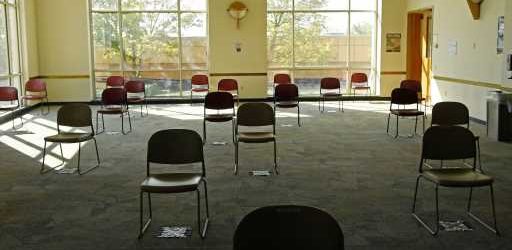At the pace felony jury trials are currently happening in Adams and Broomfield counties, it would take seven years for the courts to get through just the trials scheduled in the next six months.
The 17th Judicial District has more than 700 felony jury trials on its calendar, but is currently holding just two a week because of COVID-19 safety restrictions, District Attorney Brian Mason said.
“It literally could take years to get through this backlog,” he said.
Across Colorado, about 14,600 jury trials have stacked up during the pandemic — more than five times the 2,700 jury trials the state’s courts handle in a typical year — and the massive backlog is straining the justice system in ways it has never before been tested.
Court staff, defense attorneys, prosecutors, judges and even the state legislature are taking a variety of measures to try to address the logjam, including renting extra space, trying to hire more staff and making it easier for retired judges to temporarily return to the bench to shoulder some of the workload.
Driving the urgency is defendants’ right to be brought to trial within six months of entering a plea, a mark that has been impossible to meet during the pandemic. Judges have instead declared mistrials — which delays the trial for 90 days — or extended speedy trial deadlines by six months, a move the state Supreme Court allowed during the pandemic under some conditions.
In the coming months, some of those 14,600 cases set for trial will resolve in plea agreements, and the courts will continue to loosen restrictions and hold more trials as the pandemic comes to an end. Some judicial districts in less populated parts of the state are poised to bounce back by the end of the summer — but the state’s busiest judicial districts are still facing a long road back to normalcy.
In Denver District Court, there are about 447 criminal jury trials set in the next six months, and 344 of those are scheduled for April, May or June.
“The backlog is really overwhelming to the system right now, and it impacts the rights of defendants, and it impacts the rights of victims, and it certainly impacts the ability of the system — from judges to prosecutors to defense attorneys — to keep up,” Mason said.
Right to a speedy trial
The legislature could change the general speedy trial deadline, but so far no bills have been introduced to do so. The prospect is opposed by the Colorado Criminal Defense Bar, said Ann Roan, a board member.
“Speedy trial is an incredible motivator,” she said. “Without that hard timeframe, people procrastinate, and you should not be procrastinating with something as fundamental and constitutionally protected as the right to a jury trial.”
Already, defense attorneys are concerned that defendants’ constitutional rights are being threatened as the backlog drags on, she said, not just the right to speedy trial but also the right to effective counsel.
“Trials are set four deep in a lot of courtrooms across the state, and these are cases that have been around for a long time, so our membership is reporting that they’re trying to prepare for four trials going to trial on the same day, knowing full well that three of them are going to be continued, but they don’t know which three,” she said. “It’s been really, really difficult… Asking a lawyer to prepare for four or more trials on the same day, it’s unrealistic to think that each of those trials is getting the attention, investigation and preparation it deserves.”
She’d like to see prosecutors reduce the backlog by offering more favorable plea deals to defendants — a power only prosecutors wield.
“The idea that you can just declare mistrials and push things down the road, maybe that works out for court and laywers’ calendars, but it doesn’t work out at all or the person sitting in jail or the person who has suffered a terrible loss,” she said.
Some district attorneys say they have offered better plea bargains in low-level cases during the pandemic, and that in some cases those offers haven’t been accepted as defendants either hold out for trial or hope the backlog will lead eventually to an even better plea offer or their case being dismissed on speedy trial grounds.
“A lot of defendants are unwilling to consider a plea bargain until the eve of trial, when they are actually facing a jury that is coming in to hear the case and if they are convicted they might face some mandatory time,” said 21st Judicial District Attorney Dan Rubinstein.
Mesa County typically holds about 75 felony jury trials a year, he said, and last year conducted only one. But with COVID-19 beginning to fade locally, trial dates are finally arriving for defendants — and the backlog is rapidly declining.
“While we do have a huge backlog — 14 months of cases crammed into three months — we are quickly resolving cases by people who are facing their upcoming trials and have come to terms with the need to enter a plea agreement,” he said.
Rubinstein expects the courts in Mesa County to return to full, pre-pandemic capacity within a week or two. Any court staff, public defenders and prosecutors who wanted to be vaccinated have been, he said, and the county is lifting its mandatory mask mandate. Working through the local jury trial backlog could take between six and nine months, he estimated.
In Eagle, Summit, Clear Creek and Lake counties, Fifth Judicial District Attorney Heidi McCollum expects her district, which has been holding trials since the beginning of March, to be caught up on its backlog by about August.
In the much busier 18th Judicial District, which includes Arapahoe, Douglas, Elbert and Lincoln counties, District Attorney John Kellner estimated it’ll take a year or two to work through the backed-up cases.
In Arapahoe County alone, there are 212 jury trials scheduled for May and 264 scheduled for June. The court can currently hold about 24 felony and misdemeanor jury trials a month.
Prosecutors are prioritizing cases involving violent crimes or serious felonies, he said, as well as cases that have been pending for a long time. Judges are scheduling multiple trials for the same day to ensure at least one proceeds despite any unforeseen delays, like a COVID-19 exposure, he said.
That means the district attorney’s office — like defense attorneys — must prepare for all of the cases, straining resources.
“We’re less likely to staff a case with two attorneys,” Kellner said. “Often you have one more experienced attorney and one less experienced attorney on a case to build up their experience, and we don’t have the luxury of doing that right now.”
In the 17th Judicial District, Mason said he needs to hire more attorneys to address the backlog.
“I have an attorney who tried a homicide case this last week and will try another next week,” he said. “That’s really unusual to try two back-to-back homicide trials.”
Socially distanced jury selection
For the May trial of accused STEM school shooter Devon Erickson, officials in the 18th Judicial District plan to rent out hotel space in order to call in 600 potential jurors without violating COVID-19 social distancing requirements.
That’s a strategy used by several judicial districts. In Pueblo, court officials rented the Pueblo Convention Center to call in 1,200 prospective jurors for a high-profile murder trial this spring.
It took a significant amount of planning to make the space work for jury selection, 10th Judicial District Court Executive Laura Snyder said. Officials rented metal detectors for security and even a copy machine — which could only be rented by the month, although it was needed for just two days.
The space itself cost $3,500 a day, she said, and while it provided the physical area needed to bring in such a large group, it didn’t expand the district’s overall trial capacity because it didn’t alleviate pressure on staffing, Snyder said.
“I don’t get extra staff because I’m holding a trial off-site,” she said, “and yet it takes extra staff to man a different space, because the space isn’t a court space, it’s a public space, and there are extra entries and things to consider that I need a body there to address.”
To help on the staffing side, state lawmakers are currently considering a bill that would make it easier for retired judges to return to the bench under the existing senior judge program. Instead of requiring retired judges to serve for at least 60 or 90 days, the bill would allow retired judges to return for as little as 10 days, giving more flexibility to retirees and to courts.
That could be a helpful addition, officials said, in the districts that have space available for senior judges to set up shop.
“The only way the courts can meet our speedy trial obligations is to have additional judges and courtrooms available for overflow trials from the criminal divisions,” 17th Judicial District Chief Judge Don Quick wrote in a March letter to the district attorney’s office. “I have not heard any other suggestions from anyone how else the courts can comply with the speedy trial statute.”
He added that judges are also willing to accept plea agreements they “might not accept under normal circumstances.”
For Snyder, who oversees about 70 court staff in Pueblo, dealing with the pandemic for a year showed her that the backlog’s challenges must be tackled one day at a time.
“It’s just slowed us down to say, ‘What can we do in this situation,’ and ‘OK, what can we do in this (other) situation,’” she said. “Whereas before, when we had a trial, we knew the aspects of it and we could accommodate everything. Now, we need to make sure we understand all the needs in more detail of each trial specifically… We just need to be patient and work our way through it.”
Source: Read Full Article


